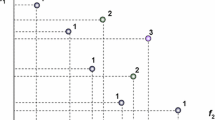Abstract
This article addresses the problem of scheduling in oil refineries. The problem consists of a multi-product plant scheduling, with two serial machine stages—a mixer and a set of tanks—which have resource constraints and operate on a continuous flow basis. Two models were developed: the first using mixed-integer linear programming (MILP) and the second using genetic algorithms (GA). Their main objective was to meet the whole forecast demand, observing the operating constraints of the refinery and minimizing the number of operational changes. A real-life data-set related to the production of fuel oil and asphalt in a large refinery was used. The MILP and GA models proved to be good solutions for both primary objectives, but the GA model resulted in a smaller number of operational changes. The reason for this is that GA incorporates a multi-criteria approach, which is capable of adaptively updating the weights of the objective throughout the evolutionary process.
Similar content being viewed by others
References
Ballintijn K. (1993) Optimization in refinery scheduling: Modeling and solution. Optimization in industry. Mathematical Programming and Modeling Techniques in Practice 1: 191–199
Berrichi, A., Amodeo, L., Yalaoui, F., Châtelet, E., & Mezghiche, M. (2008). Bi-objective optimization algorithms for joint production and maintenance scheduling: Application to the parallel machine problem. Journal of Intelligent Manufacturing. doi:10.1007/s10845-008-0113-5.
Blazewicz J., Domschke W., Pesch E. (1996) The job shop scheduling problem: Conventional and new solution techniques. European Journal of Operational Research 93(1): 1–33. doi:10.1016/0377-2217(95)00362-2
Casas-Liza J., Pinto J. (2005) Optimal scheduling of a lube oil and paraffin production plant. Computers and Chemical Engineering 29(6): 1329–1344. doi:10.1016/j.compchemeng.2005.02.032
Chryssolouris G., Subramaniam V. (2001) Dynamic scheduling of manufacturing job shops using genetic algorithms. Journal of Intelligent Manufacturing 12(3): 281–293. doi:10.1023/A:1011253011638
Churchland P., Sejnowski T. (1996) The Computational Brain. MIT Press, Cambridge, MA
Dahal K., Burt G., NcDonald J., Moyes A. (2001) A case study of scheduling storage tanks using a hybrid genetic algorithm. IEEE Transactions on Evolutionary Computation 5(3): 283–294
Göthe-Lundgren M., Lundgren J., Pearson J., i Linköping U., Mathematics D. O. (2002) An optimization model for refinery production scheduling. International Journal of Production Economics 78(3): 255–270. doi:10.1016/S0925-5273(00)00162-6
He Y., Hui C. (2007) Genetic algorithm based on heuristic rules for high-constrained large-size single-stage multi-product scheduling with parallel units. Chemical Engineering and Processing. Process Intensification 46(11): 1175–1191. doi:10.1016/j.cep.2007.02.023
Horn J. (1997) Multicriterion Decision Making. In: Back T., Fogel D. B., Michalewicz Z. (eds) Handbook of evolutionary computation. IOP Publ. Ltd and Oxford University Press, Oxford
Jia H. Z., Nee A. Y. C., Fuh J. Y. H., Zhang Y. F. (2003) A modified genetic algorithm for distributed scheduling problems. Journal of Intelligent Manufacturing 14(3): 351–362. doi:10.1023/A:1024653810491
Joly M., Moro L., Pinto J. (2002) Planning and scheduling for petroleum refineries using mathematical programming. Brazilian Journal of Chemical Engineering 19: 207–228. doi:10.1590/S0104-66322002000200008
Jonathan, M., Zebulum, R., Patheco, M., & Vellasco, M. (2000). Multiobjective optimization techniques: a study of the energy minimization method and its application to the synthesis of ota amplifiers.
Kallrath J. (2002) Planning and scheduling in the process industry. OR-Spektrum 24(3): 219–250. doi:10.1007/s00291-002-0101-7
Karuppiah, R., Furman, K. C., & Grossmann, I. E. (2008). Global optimization for scheduling refinery crude oil operations. Computers and Chemical Engineering (in press).
Khosla D., Gupta S., Saraf D. (2007) Multi-objective optimization of fuel oil blending using the jumping gene adaptation of genetic algorithm. Fuel Processing Technology 88(1): 51–63. doi:10.1016/j.fuproc.2006.08.009
Lee I., Sikora R., Shaw M. (1997) A genetic algorithm-based approach to flexible flow-line scheduling with variable lot sizes. Systems, Man and Cybernetics, Part B, IEEE Transactions on 27(1): 36–54
Luo Y.-C., Guignard M., Chen C.-H. (2001) A Hybrid approach for integer programming combining genetic algorithms, linear programming and ordinal optimization. Journal of Intelligent Manufacturing 12(5): 509–519. doi:10.1023/A:1012256521687
Martin C. (2009) A hybrid genetic algorithm/mathematical programming approach to the multi-family flowshop scheduling problem with lot streaming. Omega 37(1): 126–137. doi:10.1016/j.omega.2006.11.002
Moon C., Seo Y., Yun Y., Gen M. (2006) Adaptive genetic algorithm for advanced planning in manufacturing supply chain. Journal of Intelligent Manufacturing 17(4): 509–522. doi:10.1007/s10845-005-0010-0
Morad N., Zalzala A. M. S (1999) Genetic algorithms in integrated process planning and scheduling. Journal of Intelligent Manufacturing 10(2): 169–179. doi:10.1023/A:1008976720878
Moro L. (2003) Process technology in the petroleum refining industry—current situation and future trends. Computers & Chemical Engineering 27(8-9): 1303–1305. doi:10.1016/S0098-1354(03)00054-1
Moro L., Pinto J. (2004) Mixed-integer programming approach for short-term crude oil scheduling. Industrial and Engineering Chemistry Research 43(1): 85–94. doi:10.1021/ie030348d
Pinto J., Joly M., Moro L. (2000) Planning and scheduling models for refinery operations. Computers and Chemical Engineering 24(9-10): 2259–2276. doi:10.1016/S0098-1354(00)00571-8
Potts C., Kovalyov M. (2000) Scheduling with batching: A review. European Journal of Operational Research 120(2): 228–249. doi:10.1016/S0377-2217(99)00153-8
Sahdev, M. K., Jain, K. K., & Srivastava, P. (2004). Petroleum refinery planning and optmization using linear programming: Cheresources.
Simão, L., Dias, D., & Pacheco, M. (2007). Refinery scheduling optimization using genetic algorithms and cooperative coevolution.
Turkcan A., Akturk M. S. (2003) A problem space genetic algorithm in multiobjective optimization. Journal of Intelligent Manufacturing 14(3): 363–378. doi:10.1023/A:1024605927329
Wang H.-f., Wu K.-y (2003) Modeling and analysis for multi-period, multi-product and multi-resource production scheduling. Journal of Intelligent Manufacturing 14(3): 297–309. doi:10.1023/A:1024645608673
Wu N., Zhou M., Chu F. (2005) Short-term scheduling for refinery process: Bridging the gap between theory and applications. International Journal of Intelligent Control and Systems 10(2): 162–174
Zebulum, R. S., Pacheco, M. A., & Vellasco, M. (1998). Synthesis of CMOS operational amplifiers through genetic algorithms. Proceedings of XI Brazillian symposium on integrated circuit design, pp. 125–128.
Author information
Authors and Affiliations
Corresponding author
Rights and permissions
About this article
Cite this article
Oliveira, F., Hamacher, S. & Almeida, M.R. Process industry scheduling optimization using genetic algorithm and mathematical programming. J Intell Manuf 22, 801–813 (2011). https://doi.org/10.1007/s10845-009-0339-x
Received:
Accepted:
Published:
Issue Date:
DOI: https://doi.org/10.1007/s10845-009-0339-x




